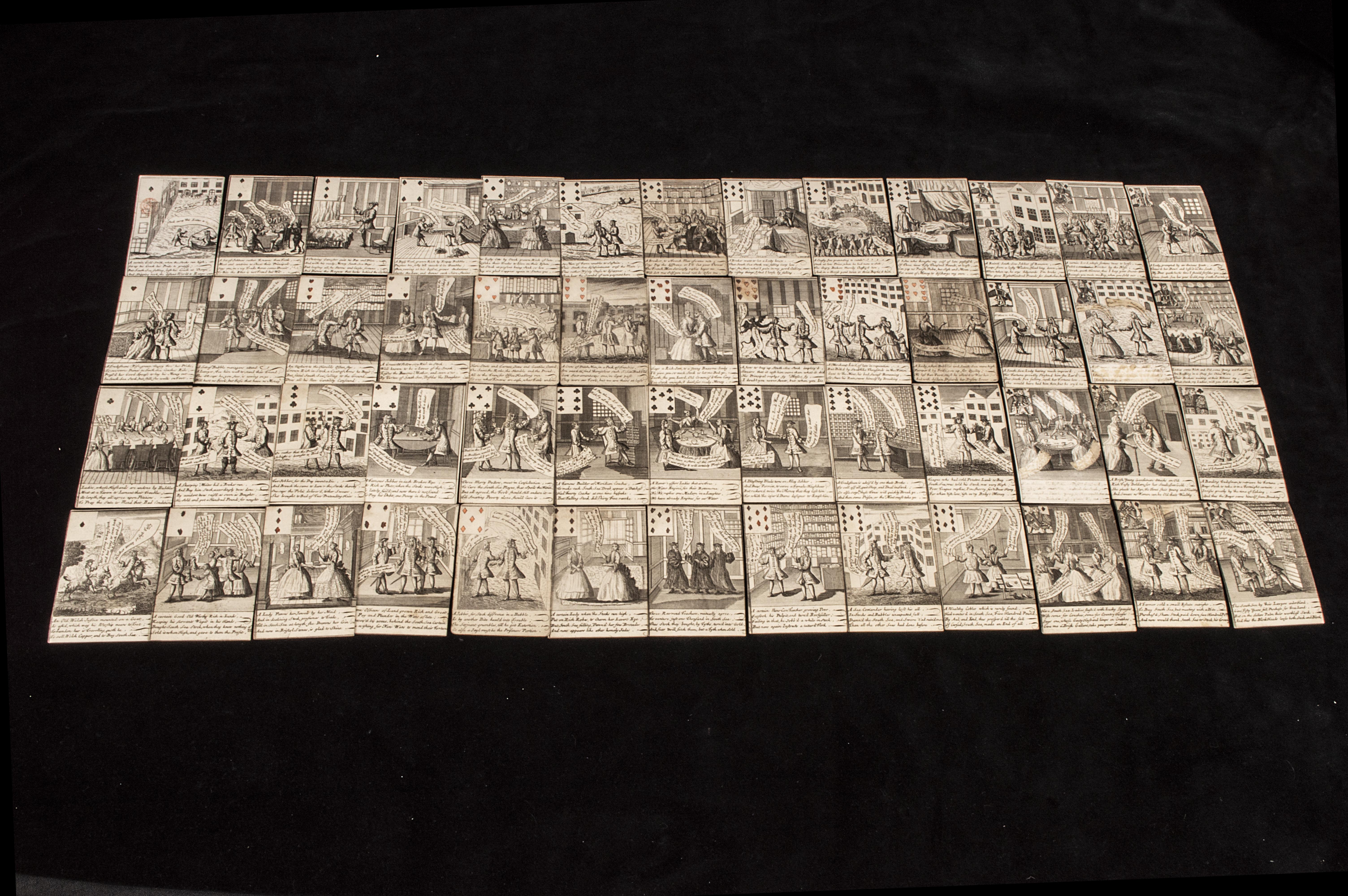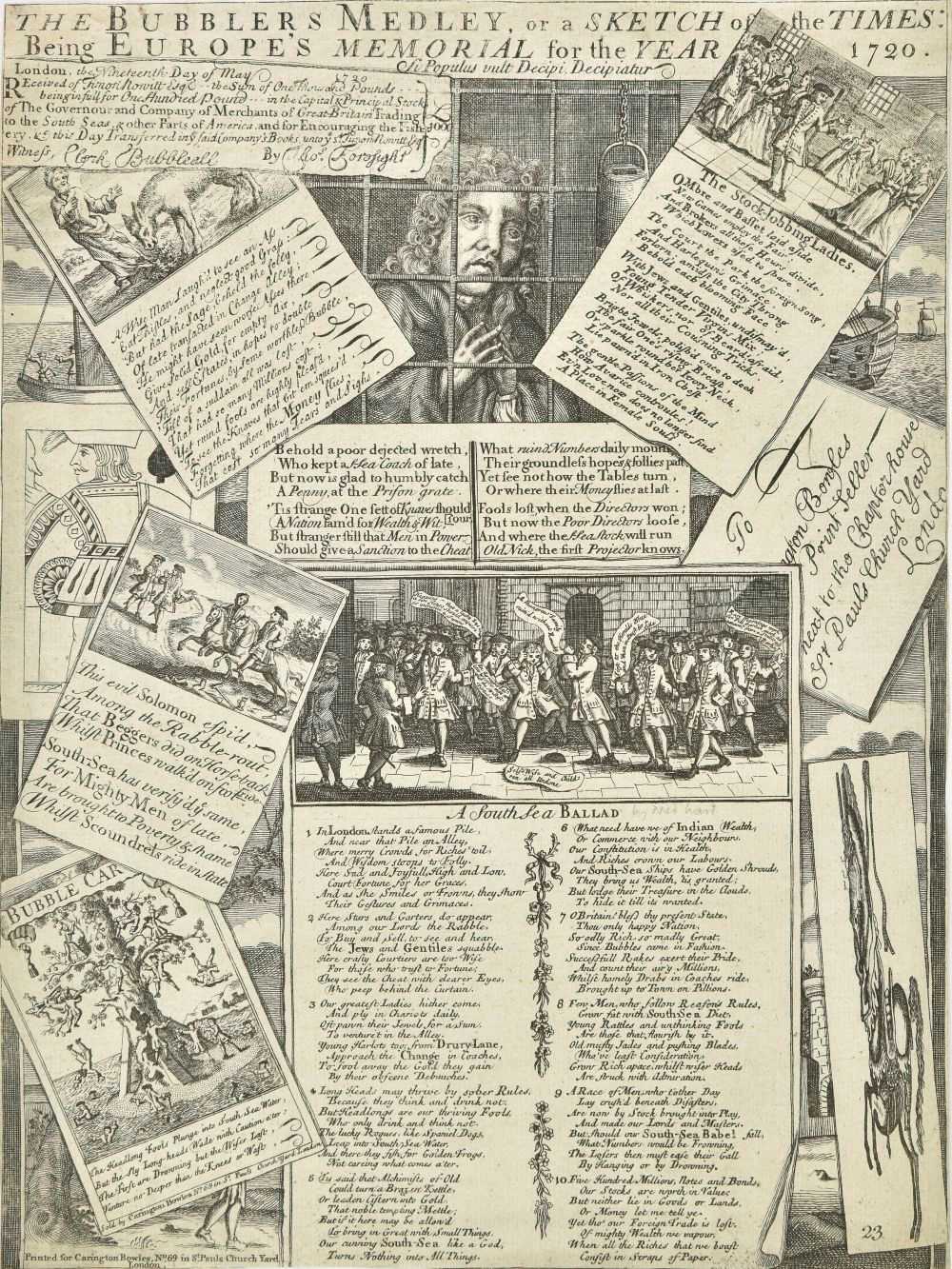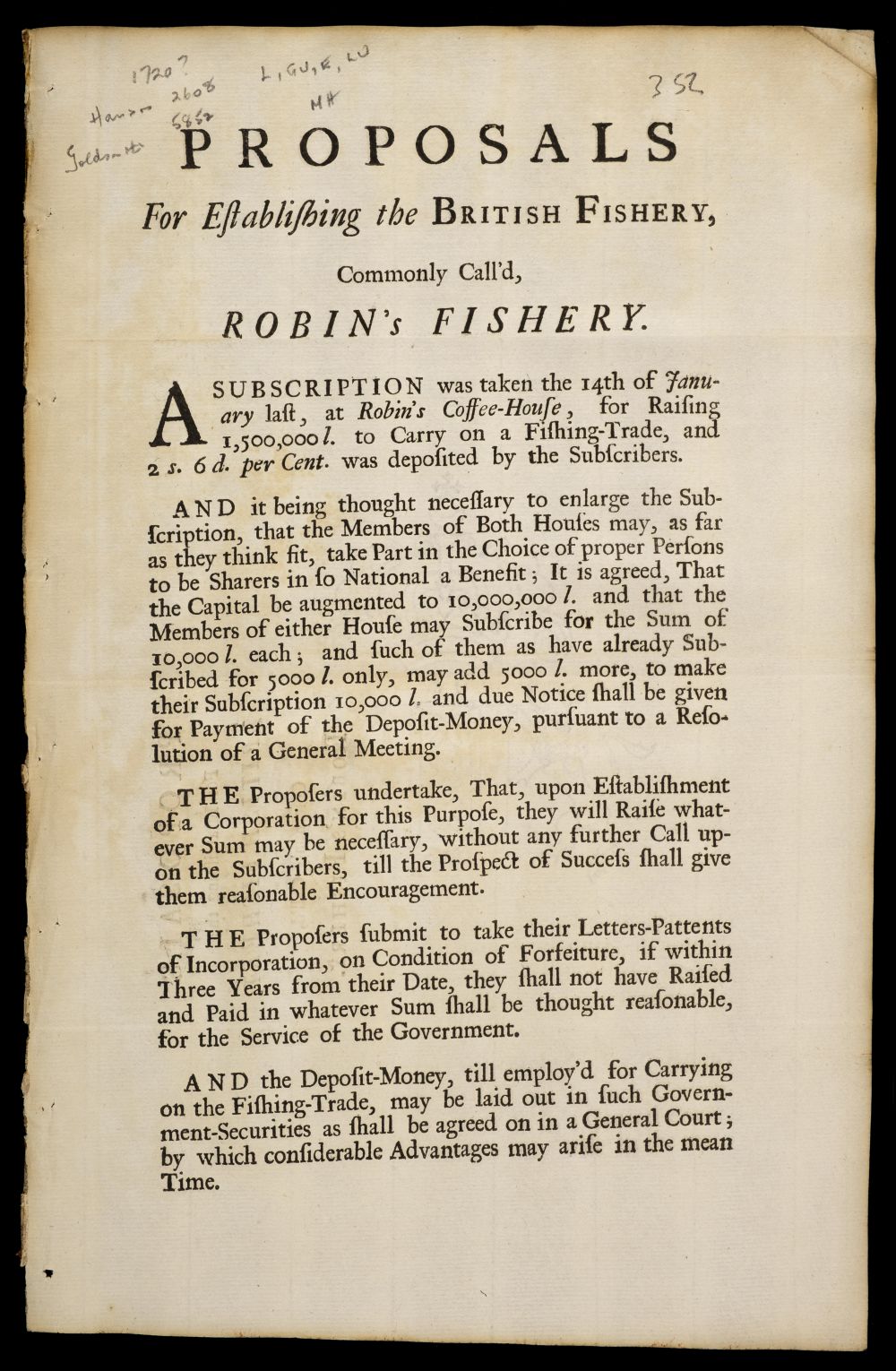SOUTH SEA BUBBLE]. SOUTH SEA TRADE COMPANY. Manuscript Letters Patent, (unexecuted), constituting the articles of incorporation for the South Sea Trade Company, drawn up under the authority of Parliament and Queen Anne, dated Westminster, 5 September 1711. 20 pages, oblong folio, 642 x 696 mm. (25¼ x 27½ in.) . WRITTEN ON PARCHEMENT, on rectos only, in a clear scribal hand (each sheet signed by the scribe, William Cooke at lower corner), some additions in another hand, the sheets sewn with heavy thread at left-hand margin, each sheet with rectangular blue paper tax stamp, a few punctures to parchment, otherwise in excellent condition. "THE SOUTH SEA BUBBLE": A DRAFT CHARTER FOR THE SOUTH SEA COMPANY An elaborate charter of incorporation--not executed and possibly constituting a draft--for the South Sea Trade Company, an early experiment in public stock ownership and the public debt whose ambitious manipulations resulted in "the great South Sea Bubble" and culminated in a disastrous financial collapse in 1720. Daniel Defoe was an early proponent of the scheme, and actively recommended it to Edward Harley, brother of Robert Harley, Earl of Oxford, later named Governor of the firm. The Company was established in 1711, under an Act of Parliament "for Making Good Deficiencies and Satisfying the Publick Credit and for Erecting a Corporation to Carry on a Trade to the South Seas" (p.1); the promoters, various wealthy individuals, subscribed £ 9,471,325 of the national debt on which they were to receive 6 interest annually, computed at £ 568,279. The company was granted a monopoly on British trade with all of South America and the Pacific islands, a trade widely believed to be illimitable. The present charter may constitute a draft of the final Charter granted, as evidenced by the sections of text which have been filled in in a different hand. On pages 4 and 6, in blank areas left for the purpose, the names of the Governor (Robert Harley, Earl of Oxford), Sub-Governors and 30 Directors are inserted. The lengthy text details the procedures and rules for voting by directors, the exchange and assignment of capital stock and other organizational and functional aspects of the company. The South Sea Company prospered from the outset and enjoyed enormous success from 1713, largely from lucrative slave-trading rights granted under the Treaty of Asiento with Spain. The Company became a rival of the Bank of England; in 1719, it offered to take over the entire national debt, then some £51,000,000 and to pay the government £3,500,000 for this privilege. Although the Bank bid £5,000,000 for the privilege, the Company promptly bid over £7,000,000, and in 1720 the agreement was finalized. Over half of the holders of government annuities converted their annuities to stock in the Company. Unbridled speculation began: from the price of 128½ in January, the stock rose to 330 in March (at this point the Directors sold 2,250,000 shares), to 550 in May, to 890 in June and in July to 1000 (at which point the Directors sold another 5,000,000 shares). In August the bubble burst, and the stock by November had crashed to 135. Thousands of investors and annuity-holders were ruined, the Bank of England's stocks were threatened. Parliament and the Walpole government launched an investigation of the Company and its principals which uncovered blatant bribery, speculation and manipulation; it resulted eventually in the confiscation of the estates of the Directors. Provenance : Anonymous owner (sale, Sotheby's, London, 18 June 1934, lot 212) -- Calvin Bullock -- Hugh Bullock.
SOUTH SEA BUBBLE]. SOUTH SEA TRADE COMPANY. Manuscript Letters Patent, (unexecuted), constituting the articles of incorporation for the South Sea Trade Company, drawn up under the authority of Parliament and Queen Anne, dated Westminster, 5 September 1711. 20 pages, oblong folio, 642 x 696 mm. (25¼ x 27½ in.) . WRITTEN ON PARCHEMENT, on rectos only, in a clear scribal hand (each sheet signed by the scribe, William Cooke at lower corner), some additions in another hand, the sheets sewn with heavy thread at left-hand margin, each sheet with rectangular blue paper tax stamp, a few punctures to parchment, otherwise in excellent condition. "THE SOUTH SEA BUBBLE": A DRAFT CHARTER FOR THE SOUTH SEA COMPANY An elaborate charter of incorporation--not executed and possibly constituting a draft--for the South Sea Trade Company, an early experiment in public stock ownership and the public debt whose ambitious manipulations resulted in "the great South Sea Bubble" and culminated in a disastrous financial collapse in 1720. Daniel Defoe was an early proponent of the scheme, and actively recommended it to Edward Harley, brother of Robert Harley, Earl of Oxford, later named Governor of the firm. The Company was established in 1711, under an Act of Parliament "for Making Good Deficiencies and Satisfying the Publick Credit and for Erecting a Corporation to Carry on a Trade to the South Seas" (p.1); the promoters, various wealthy individuals, subscribed £ 9,471,325 of the national debt on which they were to receive 6 interest annually, computed at £ 568,279. The company was granted a monopoly on British trade with all of South America and the Pacific islands, a trade widely believed to be illimitable. The present charter may constitute a draft of the final Charter granted, as evidenced by the sections of text which have been filled in in a different hand. On pages 4 and 6, in blank areas left for the purpose, the names of the Governor (Robert Harley, Earl of Oxford), Sub-Governors and 30 Directors are inserted. The lengthy text details the procedures and rules for voting by directors, the exchange and assignment of capital stock and other organizational and functional aspects of the company. The South Sea Company prospered from the outset and enjoyed enormous success from 1713, largely from lucrative slave-trading rights granted under the Treaty of Asiento with Spain. The Company became a rival of the Bank of England; in 1719, it offered to take over the entire national debt, then some £51,000,000 and to pay the government £3,500,000 for this privilege. Although the Bank bid £5,000,000 for the privilege, the Company promptly bid over £7,000,000, and in 1720 the agreement was finalized. Over half of the holders of government annuities converted their annuities to stock in the Company. Unbridled speculation began: from the price of 128½ in January, the stock rose to 330 in March (at this point the Directors sold 2,250,000 shares), to 550 in May, to 890 in June and in July to 1000 (at which point the Directors sold another 5,000,000 shares). In August the bubble burst, and the stock by November had crashed to 135. Thousands of investors and annuity-holders were ruined, the Bank of England's stocks were threatened. Parliament and the Walpole government launched an investigation of the Company and its principals which uncovered blatant bribery, speculation and manipulation; it resulted eventually in the confiscation of the estates of the Directors. Provenance : Anonymous owner (sale, Sotheby's, London, 18 June 1934, lot 212) -- Calvin Bullock -- Hugh Bullock.
.jpg?w=400?width=1600&quality=70)

.jpg)









.jpg)


Testen Sie LotSearch und seine Premium-Features 7 Tage - ohne Kosten!
Lassen Sie sich automatisch über neue Objekte in kommenden Auktionen benachrichtigen.
Suchauftrag anlegen